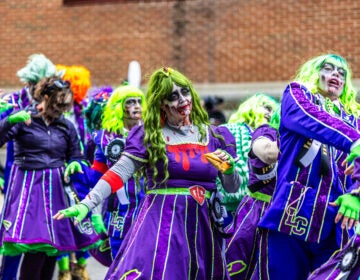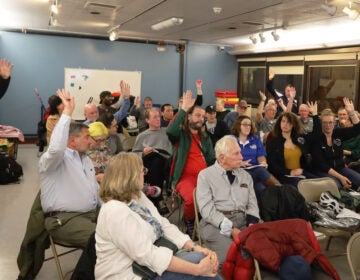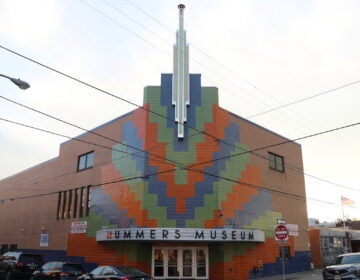Members of South Philly mummers club do Father’s Day their way with Doo-Wop
On Saturday night at the South Philly String Band Club, the dads controlled the soundtrack.
Listen 0:49-
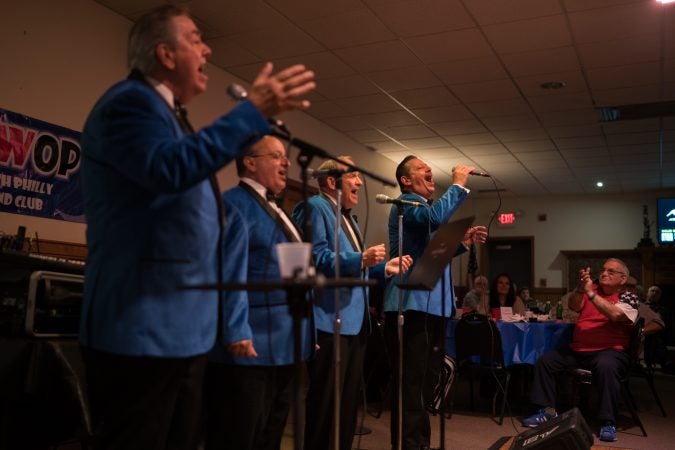
Blue Velvet performs at the Father's Day spaghetti dinner at the South Philly String Band Club. (Branden Eastwood for WHYY)
-
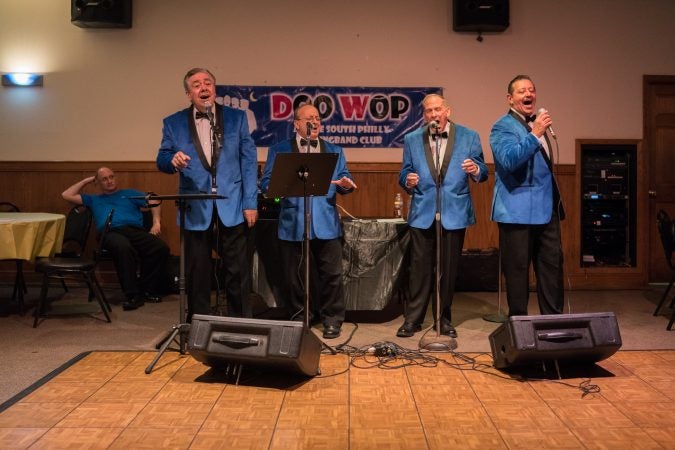
Blue Velvet performs at the Father's Day spaghetti dinner at the South Philly String Band Club. (Branden Eastwood for WHYY)
-
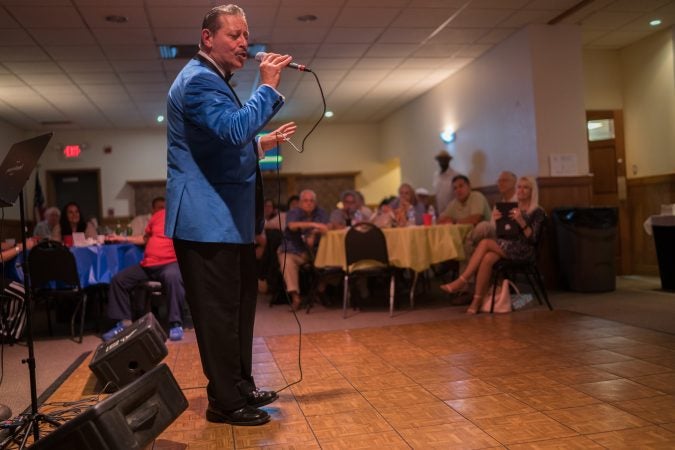
Gil Torres of Blue Velvet performs at the Father's Day spaghetti dinner at the South Philly String Band Club. (Branden Eastwood for WHYY)
-
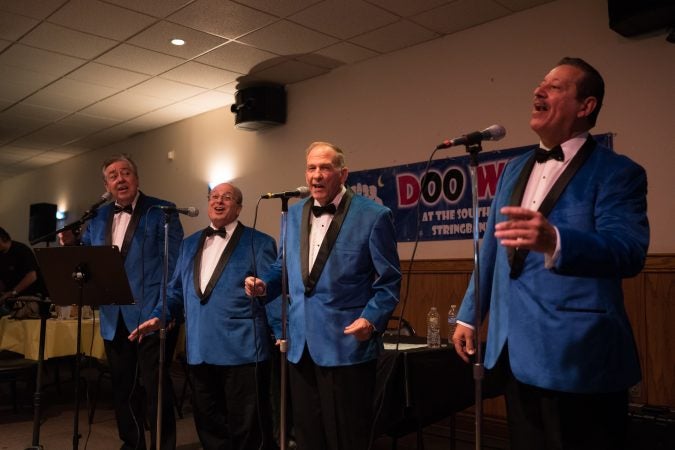
Blue Velvet performs at the Father's Day spaghetti dinner at the South Philly String Band Club. (Branden Eastwood for WHYY)
-
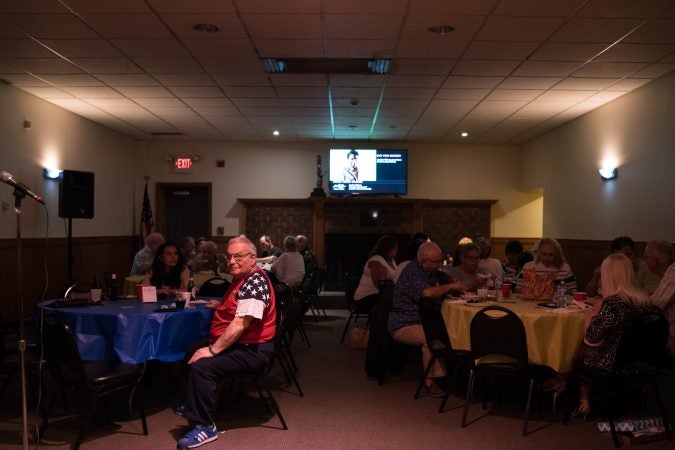
The crowd takes in the music at the Father's Day spaghetti dinner at the South Philly String Band Club. (Branden Eastwood for WHYY)
-
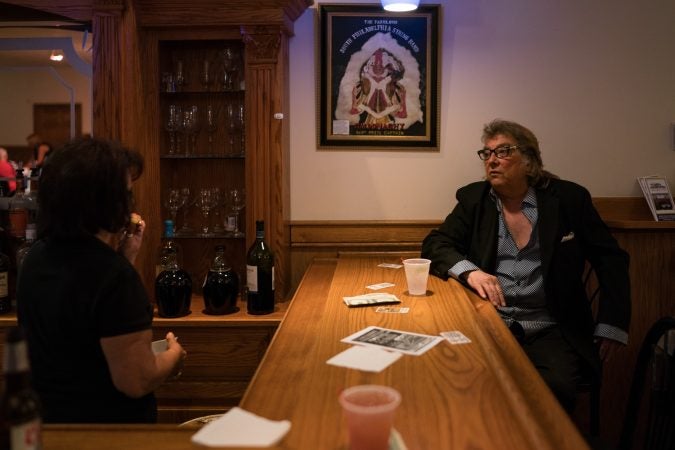
Billy Carlucci of the doo-wop group Billy and The Essentials speaks with the bartender at the Father's Day spaghetti dinner at the South Philly String Band Club. (Branden Eastwood for WHYY)
-
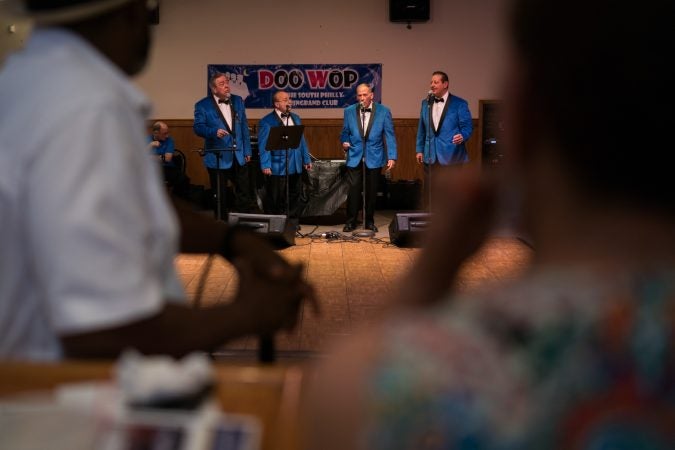
Blue Velvet performs at the Father's Day spaghetti dinner at the South Philly String Band Club. (Branden Eastwood for WHYY)
On Saturday night at the South Philly String Band Club, the dads controlled the soundtrack.
It was only right as they gathered at the club on Porter Street for a spaghetti dinner to celebrate Father’s Day their way — with an evening of Doo-Wop music.
The music, sung a cappella, was once a staple of the neighborhood, and still has an audience at the club, known as a home base for Philadelphia’s annual Mummers Parade.
Bob Buerklin has been running the Doo-Wop nights twice a month for 13 years to raise money to cover the club’s parade expenses. The South Philly String Band formed in 1946, and strutted in its first parade the following year.
“It costs us something like $125,000 a year, so I figured this would be a good way to help out,” said Buerklin.
But on Doo-Wop nights, there are no banjos, saxophones or flashy, golden slippers.
About fifty people from the Philadelphia suburbs and New Jersey — most well into their retirements — filled plates of homemade meatballs, steamed mussels, and braised chicken. As they ate, four men wearing tuxedos with dark blue jackets crooned covers of songs by The Moonglows in harmony.
John Poloney, a member of the group Blue Velvet, remembers singing as a way to woo the ladies.
“The guys who sang always had the girls hanging around them, you know what I mean?” he said with a smile.
Buerklin first started singing back in the 1950s. His parents worked long hours — his father at a steel mill and his mother at Whitman Candies — and he said singing Doo-Wop music was a cheap way for the kids to amuse themselves.
“In South Philly, you could go out and every three blocks there would be another group of kids singing,” Buerklin said.
Some South Philly kids made it to the big time — like Billy Carlucci, who stopped by the club on Saturday night after a career spanning nearly sixty years. His group Billy and the Essentials got its start while he was still a student at Bartrum High School.
But the roots of Doo-Wop are in the black communities of East Coast cities like New York.
“Back then, there were black and white radio stations,” said Val Shively, the owner of R & B Records in Upper Darby. He credits Philadelphia DJ Jerry Blavat with introducing white teenagers like him to the early Doo-Wop music being performed by all-black groups, such as The Crows and The Orioles.
“He started playing these records on the white stations and that was it for me,” said Shively, who has been collecting Doo-Wop records ever since.
Buerklin remembers more humble comings together in a city often divided by race. He said one of the singers in his mostly white Doo-Wop group was black.
“And we’d sit there on a Friday, Saturday night drinking a quart of beer underage — which we would do anyway,” he said. “And you know, it’d be blacks and whites and we’d sing all night long.”
Jim DiRado grew up in the city’s Frankford neighborhood listening to records of local groups. Like many at the club, he is getting older, and while the popularity of Doo-Wop has faded over the decades, DiRado says the music he loves isn’t going anywhere.
“My son got married a few years ago, and what song were they playing? ‘Going to the chapel and we’re going to get married,’ ” he said. “That song was 50 years old and they’re playing it at his wedding.”
WHYY is your source for fact-based, in-depth journalism and information. As a nonprofit organization, we rely on financial support from readers like you. Please give today.


